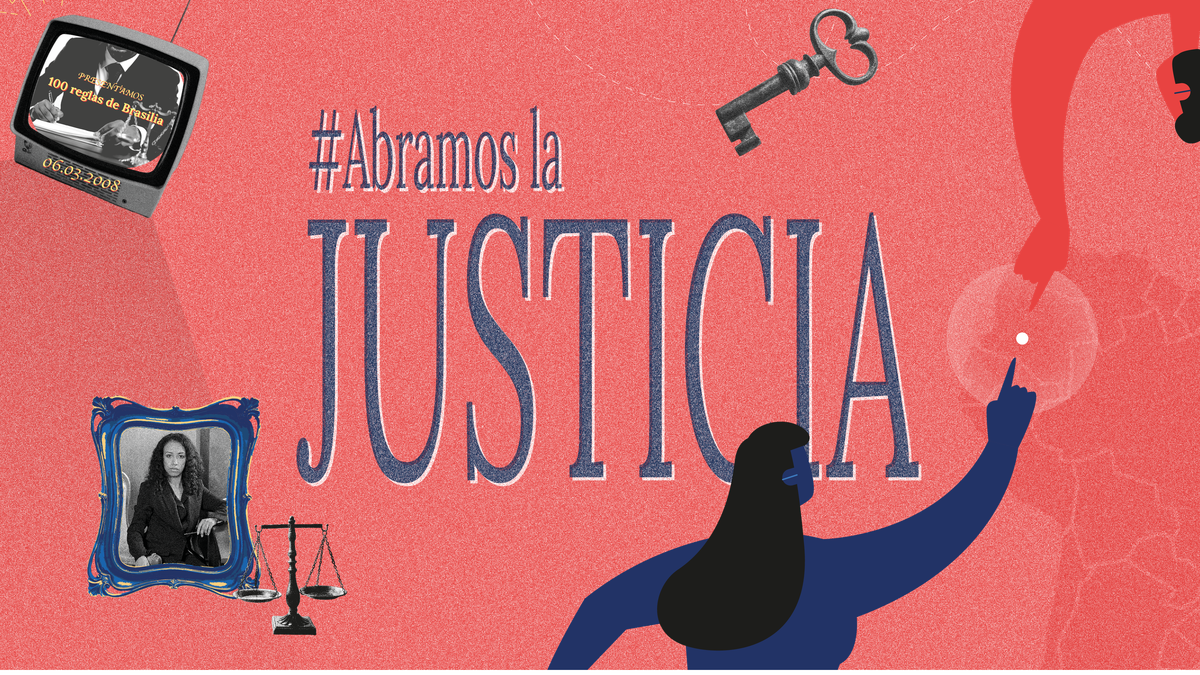When I was studying law, we were taught that justice was the same for everyone.
And I continue to believe, truly, that this is the principle that inspires the vast majority of constitutions in the world.
Over the years, when I have traveled to other places for work, I have been able to realize that their doors are not equally open to everyone.
I have seen women victims of gender-based violence give up filing a complaint out of fear, pressure from their abuser or mistrust of police and judicial institutions.
I have seen how people who have not been able to go to school or who speak native languages do not know their rights or feel overwhelmed by legal language that is often very technical and incomprehensible, thus refusing to resort to the institutions that could enforce them.
A situation that has particularly impacted me is that of people deprived of liberty in prisons in Latin America, waiting indefinitely for a trial that does not come and in situations, as I have seen in some visits to prisons, of completely unsustainable overcrowding.
Not to mention those who live in remote places or in neighborhoods on the outskirts of the big cities of the continent, who simply cannot afford to pay for transportation to get to the courthouse to file a complaint.
When you dedicate yourself to international cooperation, you soon realize that there are complex situations that cannot be resolved with a single specific project for a population group and with a limited time frame (beginning-end) that does not allow it to last or for a single institution or donor in isolation.
All solidarity and help are necessary in a world wounded by inequalities, but band-aids will not be enough to heal it
I believe in the power of institutions and cooperation, and in the collaboration between both to promote profound and sustainable changes.
But above all, I believe in the power of people, in the daily effort and vocational impulse of judges, prosecutors, defenders to generate change from within their institutions, to achieve a more accessible and equitable justice for all, without discrimination based on sex, age, origin or belonging to any group.
That is why we have decided to cooperate – which means nothing more than acting together – with the justice institutions of Europe and Latin America in order to remove all obstacles and open their doors wide.
I believe that it is important that less classical forms of cooperation be known.
100 rules of Brasilia for equal access to justice
This path began in 2008 when the 100 Brasilia rules for access to justice for people in vulnerable situations were approved at the XIV Ibero-American Judicial Summit.
This text, a reference in the region, was prepared by the Ibero-American Judicial Summit in coordination with the main justice networks in Latin America (Ibero-American Association of Public Ministries (AIAMP) and the Inter-American Association of Public Defenders (AIDEF), and the international organization Conference of Ministers of Justice of Ibero-American Countries (COMJIB).In 2018 it was updated and includes a series of principles and recommendations for public bodies and for those who provide their services in the judicial system.And they not only refer to the promotion of policies that guarantee such access,
For whom it is?
Boys, girls, adolescents, the elderly, disabled people, indigenous communities, victims, people in a situation of mobility (including migrants and refugees), in a situation of poverty, women, people deprived of liberty, LGTBIQ+ people... Among other groups in a situation of vulnerability.
That of justice is also a key to many other basic rights such as health, housing, education or employment.
Last January, three judicial networks (AIDEF, AIAMP and COMJIB) made a statement in Valparaíso on how the pandemic has affected justice, and especially the most vulnerable people – 30 million new poor in Latin America due to the pandemic, according to ECLAC – and made a call to continue promoting access as an essential pillar for the rule of law, protection and promotion of human rights in line with the Sustainable Development Goals of the 2030 Agenda. They also included , a call for this issue to continue to be a priority line for international cooperation, whose support has been fundamental until now to promote a large part of the processes in the region.
One of the first measures adopted in this regard has been the decision to move forward with an international agreement based on the principles and recommendations of the 100 rules of Brasilia and other instruments widely accepted in the region, such as the Santiago Guidelines for the Protection of Victims and Witnesses. and the Escazú Agreement.
The importance of this agreement is crucial, because there is currently no binding international instrument on the matter.
The right of access to justice is recognized in different international conventions, but it is not fully developed.
The aforementioned are documents of what is known as
soft law
, recommendations of very high value but whose application is not mandatory.
Ask in
In times where the focus on security, hate speech and suspicion towards institutions prevail, the justice institutions will have to give clear messages so that citizens can continue to trust them.
Opening the institutions also implies inviting people to enter them, so that they are perceived as close, transparent places that provide protection and solutions.
People must be made aware of their rights and how to defend them.
Come in, come in, make yourself at home.
That of justice is also a key to many other basic rights such as health, housing, education or employment.
I think there are plenty of arguments to continue cooperating and to open the doors of justice.
María Luisa Domínguez Suárez
is responsible for inclusive justice and for the governance area of the EUROsociAL+ Program led by the FIIAPP.
You can follow PLANETA FUTURO on
,
and
, and subscribe
to our 'newsletter'
here
.

